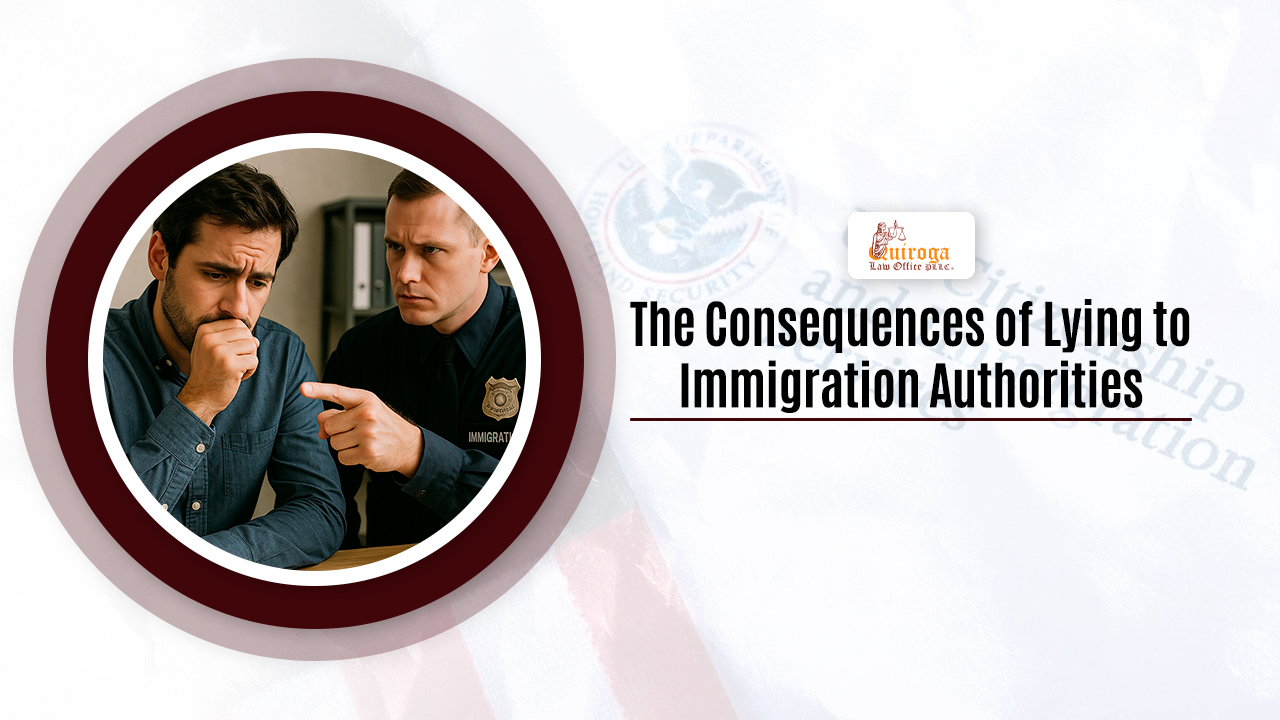When applying for an immigration benefit, whether a visa or citizenship, honesty is essential. Lying to immigration authorities, whether verbally or in writing, can lead to severe consequences. In this article, you will learn about the risks of committing immigration fraud, the most common scenarios where it happens, and possible solutions if you find yourself in this situation.
What Does Immigration Fraud Mean?
Lying to immigration authorities, known as visa fraud, is a serious offense that can permanently damage your chances of regularizing your immigration status in the United States. Such actions not only affect your credibility but are also considered evidence of poor moral character, a key factor the government evaluates in many immigration processes.
If authorities discover that you have lied, you could automatically be disqualified from receiving immigration benefits, face deportation proceedings, or even be subject to criminal charges. Honesty is not optional—it is essential.
Common Cases of Immigration Fraud
There are various ways in which people commit immigration fraud. Here are some of the most frequent examples:
- Using a false name on applications.
- Declaring an incorrect marital status.
- Hiding the actual number of children or denying having family members in the United States.
- Submitting false or altered documents.
- Providing incorrect dates of stay in the country.
- Lying about education, degrees, or qualifications.
- Falsifying information about tax payments.
Do you recognize yourself in any of these situations? If so, it is crucial to seek legal advice immediately.
Consequences of Lying to Immigration Authorities
The US Immigration and Nationality Act (INA) Section 212(a)(6)(C)(i) outlines the penalties for immigration fraud. Here are the most significant consequences:
- Permanent Inadmissibility: You will no longer be eligible for immigrant or non-immigrant visas, nor will you be able to adjust your status.
- Deportation Proceedings: If you are already in the US, the government may initiate removal proceedings against you. In severe cases, this could lead to criminal charges.
- Loss of Credibility: Immigration officers, consular officials, and judges may distrust any information you provide in future applications.
- Immediate Revocation of Benefits: If fraud is detected during a process, you will automatically lose the benefit you applied for.
These consequences are not just legal; they can also affect your personal and professional life.
How Does the US Government Detect Immigration Fraud?
Immigration authorities use multiple tools to verify the authenticity of the information provided, including:
- Consular Investigations: Documents submitted are thoroughly reviewed.
- Biometric Analysis: Fingerprints and photos are compared against global databases.
- Interviews: Officers look for inconsistencies between what you declare and what is stated in your applications.
- Anonymous Reports: Authorities may receive information from third parties about potential fraud cases.
Do not underestimate the government’s ability to verify information. Even a small inconsistency can raise suspicion and lead to a deeper investigation.
What to Do If You Have Already Committed Immigration Fraud?
If you are in this situation, it is crucial to act quickly and seek legal assistance. In some cases, you may apply for a waiver for inadmissibility, but these waivers are granted only under specific circumstances.
To improve your chances, you must demonstrate:
- Genuine remorse for your actions.
- That your inadmissibility would cause extreme hardship to a US citizen or lawful permanent resident family member.
Important: Never attempt to handle this issue alone. An experienced immigration attorney is your best ally to navigate this challenge.
Precautions to Avoid Immigration Fraud
Many people commit immigration fraud because they trust “consultants” or third parties who fill out their forms with false information. This is a mistake.
Even if someone else completes your paperwork, you are responsible for all the information submitted. To avoid problems:
- Read and verify every document before signing.
- Provide accurate and truthful information.
- Avoid shortcuts or guarantees from unqualified individuals.
Final Thoughts
Now that you know the consequences of lying to immigration authorities, it is time to make responsible decisions. Protecting your integrity and honesty will benefit you not only today but also in the future.
If you have concerns about your immigration status or need legal guidance, consult a trusted attorney. Sometimes, the longest and most difficult path is the only one that leads to success.
Remember: Lying is not an option, and immigration authorities have advanced resources to uncover irregularities. Stay informed, act transparently, and build your future in the United States the right way.



